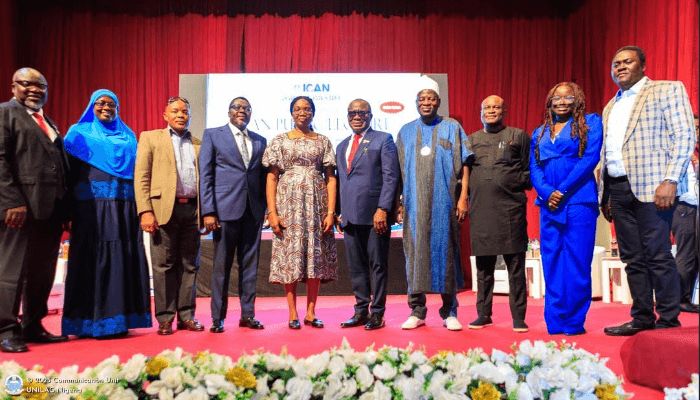ICAN call for review of Nigeria’s accounting education, practice
…as collaborates with Unilag for maiden annual public lecture
The Institute of Chartered Accountants of Nigeria (ICAN) has advocated a systematic overhaul of the country’s accounting education and practice, as Nigeria navigates rapid changes in its economic and financial landscape.
Haruna Yahaya, 61st president of ICAN, represented by Etofolam Osuji, first deputy vice president at ICAN in his remark at the 2025 public lecture of the institute held recently at the University of Lagos (Unilag), emphasised that a review of the accounting practice and education will bridge skill gaps, modernise curricula, and reinforce ethical standards across the profession.
“The accounting profession is immersed in a dynamic era characterised by cutting-edge technologies that continuously redefine how we capture, interpret, and communicate financial information. “These profound evolutions demand an innovative and agile approach to the education and training of accountants; we must equip future professionals with the advanced skills, ethical grounding, and intellectual agility required to navigate and ultimately shape this new environment,” he said.
Read also: Faith-based education can produce globally competitive scholars Bowen University
Yahaya revealed that ICAN is making strategic efforts to advance research and thought leadership, among others, which includes offering commissioned research and PhD research grants, valued at N2.5 million and N500,000 respectively, to members who fulfill the eligibility criteria.
Folasade Ogunsola, vice-chancellor of Unilag who was represented by Risikat Dauda, chairman of the board of trustees, emphasised that the accounting profession stands at the intersection of rapid technological transformation, evolving business models, and an ever-changing global economy.
“To remain relevant and impactful, we must not only adapt to these changes but also anticipate and shape them through innovation, continuous learning, and ethical excellence.
“As professionals entrusted with public confidence, as we saw in the anthem, accuracy and integrity, we must recognise that knowledge and ethical leadership remain the three pillars upon which sustainable progress is built,” she said.
Olusegun Vincent, a lecturer at Pan Atlantic University and the guest lecturer at the 2025 ICAN Public Lecture, speaking on the theme, “Embracing the future: Powering a New Era of Accounting Education and Practice,” said the discipline of accounting provides the framework for recording, analysing, and communicating financial information to support informed decision making.
However, he said, in recent decades, the field has undergone a rapid transformation due to obvious technological advancement, globalisation.
“These forces have created profound challenges for both accounting practitioners the educators, calling for a rethinking of how accounting is practised and taught in our tertiary institutions,” he said.
Vincent emphasised that the role of technological disruption cannot be overemphasised in the current age of accounting practice and education.
“The technological disruption refers to innovations that fundamentally change or replace traditional business models, methods, or systems.
“In accounting, it means replacing or transforming manual, routine accounting functions with digital, automated systems that are faster, more accurate, and data-driven. This could manifest in the form of automation, artificial intelligence, machine learning, and robotic process automation. These are replacing traditional bookkeeping and data entry tasks,” he noted.
This, he reiterated, suggests that accountants must now focus on data interpretation and strategic insight rather than manual processing.
“The blockchain technology, distributed ledger technology, changes how transactions are recorded and verified, potentially revealing the need for certain auditing processes. Because of this cryptographic design, in addition to tech disruption in accounting practice, there is data analytics.
Accountants are expected to understand and interpret large data sets, requiring new analytical visualisation and programming skills, such as we see in Power BI today,” he emphasised.
“As more financial data moves online, threats to data integrity and confidentiality have intensified, promoting new knowledge and awareness of cybersecurity risks for professional accountants,” he said.
Besides, he emphasised that the reality of these disruptions has engendered the big four and led medium-sized firms to now employ data scientists and IT experts, as well as professional accountants, to perform forensic and predictive analysis, to indeed be part of various teams that will require high-level IT content.
Read also: Professionals, policymakers move to tackle greatest challenges in global education
“Globalisation has transformed the world into a borderless economy, where goods, services, investments, and information flow freely across national boundaries,” he noted.
He said that while the integration brings opportunities, it also presents serious challenges to practising accountants, who deal with diverse international standards, complex cross-border transactions, and cultural differences in business and ethics.
He urges schools to invest in tech to properly expose accounting students to the modern skills in this tech age. Moreover, he advocates that schools should begin to employ adjunct lecturers, who are practically exposed in the field, to augment the existing ones.
This, he said, would help expose the students to the hands-on skills aspects of the profession.
Besides, he stated that universities need to equip faculties with the funds and infrastructure needed to develop the practical skills, among others.

